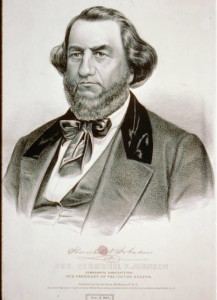Another army campaign season has drawn to a close and Richmond still hasn’t fallen. The Confederate Congress said thanks.
From the Richmond Daily Dispatch January 4, 1863:
Confederate States Congress.
The Senate was called to order by Mr. Hunter, of Va., President pro tem. Prayer by the Rev. J. L. Burrows, of the Baptist Church.
Mr. Johnson, of Ga., submitted the following preamble and resolutions, which were unanimously adopted:
Whereas, the campaigns of the brave and gallant armies covering the capital of the Confederate States during the two successive years of 1862 and 1863, under the leadership and command of Gen. Robert E. Lee, have been crowned with glorious results defeating greatly superior forces massed by the enemy for the conquest of these States; repelling the invaders with immense losses, and twice transferring the battle field from our country to that of the enemy: and whereas, the masterly and glorious achievements, rendering forever memorable the fields of the “seven days of great battles” which raised the siege of Richmond, as well as those of Cedar Run, Second Manassas, Harper’s Ferry, Boonsboro’, Sharpsburg, Winchester, Gettysburg, and Chancellorsville, command the admiration and gratitude of our country; and whereas, these and other illustrious services rendered by this able commander since the commencement of our war for independence have especially endeared him to the hearts of his countrymen, and have imposed on Congress the grateful duty of giving expression to their feelings: Therefore,
Resolved by the Congress of the Confederate States of America, That the thanks of Congress are hereby tendered to Gen. Robert E. Lee, and to the officers and soldiers of the Confederate armies under his command, for the great and signal victories they have won over the vast hosts of the enemy, and for the inestimable services they have rendered in defence of the liberty and independence of our country.
Resolved, That the President be requested to communicate these resolutions to Gen. Robert E. Lee and to the officers and soldiers herein designated. …
But there was a manpower shortage in the rebel armies. A Richmond editorial said that draft should not be extended to the very young and very old – Just round up the stragglers.
From the same issue:
The stragglers.
A gentleman who has travelled of late extensively in the Confederacy informs us that he has met everywhere a vast number of soldiers — as large a number, he thinks, as there are in camp — who are now absent from their duty. This agrees with the reports we receive from every quarter, and which are confirmed by the declaration of the Secretary of War, that the larger part of the army are absent from their posts. A friend of ours met lately with fifteen able-bodied gentlemen in one group who had managed to obtain trifling contracts, or be detailed, or obtain some other pretext for escaping their duties in the field. In some of the counties of Virginia we hear that service in the ranks is looked upon as disreputable, and that the man is considered green who cannot keep his sons or pets out of the army. In other quarters we hear of the enrolling officer permitting everybody to pass. These absentees, be it remembered, are all within the ages prescribed by the conscript law, and, if brought back to their duties, would make the forces of the Confederacy more than sufficient to cope with the enemy. Under these circumstances, is it not the height of folly to extend the conscript age, and compel schoolboys and gray-headed men to take the places of stalwart deserters? Such a course is a measure of desperation, a confession of weakness which is not warranted by the facts, a proclamation that the Confederacy is on its last legs and is compelled to play its last card. If Congress is not given over to that madness which goes before destruction it will refuse to take the “seed corn” of the country, as President Davis has aptly characterized the boys of sixteen, and the infirm old men of the country, for purposes which are not demanded by the good of the country, all whose military necessities can be supplied if, instead of making new laws, the existing legislation is enforced.
Army life was tough, though; apparently 150 years ago this winter the Confederate forces lacked another important supply:
Socks for the soldiers
are very much needed, and if sent to the Army Committee of the Young Men’s Christian Association, will be promptly forwarded to the needy now in the field.
Herschel Vespasian Johnson was Stephen A. Douglas’ running mate in the U.S. 1860 presidential election. He did not at first support secession but followed his home state out of the Union and served as a Confederate senator from Georgia from 1862 until the end of the war.

